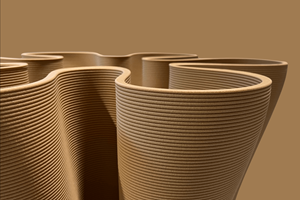Jabil, KAV Sports deliver customized composite bike helmets
Innovative materials science and 3D printing collaboration meets stringent criteria, enables mass customization for consumers.
Jabil teamed with KAV Sports on a custom material, available in different colors, to produce tailor-made, 3D-printed composite bike helmets. Photo Credit: Jabil
(St. Petersburg, Fla., U.S.) has teamed with sporting goods store (Redwood City, Calif., U.S.) on made-to-order, personalized bicycle helmets that are reported to deliver a better fit for optimized comfort and protection using custom engineered materials and additive manufacturing (AM). Recognized by Time Magazine as one of the “best inventions of 2022,” the KAV Portola helmet is made from custom nylon carbon fiber material engineered by Jabil to meet exacting standards for performance and aesthetics.
“To fulfill our mission of saving lives, we needed to produce a better-fitting helmet that people would want to wear,” Whitman Kwok, founder and CEO of KAV Sports, says. “For consumers to experience the benefits of customization, we had to overcome limitations in materials and manufacturing.”
Traditional bike helmets are made from injection-molded, expanded polystyrene (EPS) foam and come in one to three sizes, which often falls short in accommodating various head sizes and shapes. Moreover, typical helmets have limitations in stability, durability and comfort.
While KAV wanted a novel material that was as light as EPS, the company sought high performance in temperatures ranging from -15°C to more than 60°C. KAV engineers evaluated more than 20 off-the-shelf materials, all of which failed to meet the company’s criteria for absorbing high-velocity impacts or providing sufficient stability under extreme environmental conditions.
The product not only met but exceeded U.S. CPSC safety standards for impact resistance by more than 25%.
KAV enlisted the help of Jabil to create a custom material that was stiff and strong yet flexible enough to accommodate high and low temperatures. In addition to providing optimal energy absorption, the material needed to increase layer-to-layer adhesion for consistent performance, as well as improved look and feel. A team of AM engineers, chemists, materials scientists and production experts at Jabil’s Materials Innovation Center in Minnesota created a novel customized composite material — in just nine months — that met all KAV’s expectations.
To achieve this milestone, Jabil applied comprehensive innovations in materials formulation, compound development, materials systems integration and ISO 9001 quality management system (QMS) certification. “We take a polymer science approach to developing additive materials,” Matt Torosian, director, product management for AM at Jabil, explains. “Jabil engineers materials that work with additive manufacturing processes in a repeatable manner to meet customer requirements and manufacture top-quality products.”
Jabil and KAV developed and tested nearly 30 iterations of custom polymer formulations and compounds before creating the proprietary nylon carbon fiber composite that embodies all the necessary properties. Jabil’s extensive expertise and experience in materials processing, testing and scaling proved instrumental in formulating the polymer, compounding the final filament and attaining ISO 9001 QMS certification.
KAV then completed the necessary validation testing to achieve certification in accordance with the U.S. Consumer Product Safety Commission (CPSC). When KAV launched the Portola helmet featuring the new material in April 2022, the company asserted that the product not only met but exceeded U.S. CPSC safety standards for impact resistance by more than 25%.
KAV’s custom material is available in gray, black and white colors to offer flexible choices while a simple custom-fitting process and the use of 3D printing enable two-to-three-week delivery of made-to-order helmets. Production of these energy-absorbing structures would not be possible via traditional manufacturing, the partners agree. The AM process also enables KAV Sports to reduce production costs and unnecessary waste.
Thanks to its highly productive collaboration with Jabil, KAV is planning to expand its product portfolio and market reach by leveraging Jabil’s AM prowess, global AM capacity and extensive supply chain capabilities.
Visit for the KAV and Jabil case study.
Related Content
Composites end markets: New space (2025)
Composite materials — with their unmatched strength-to-weight ratio, durability in extreme environments and design versatility — are at the heart of innovations in satellites, propulsion systems and lunar exploration vehicles, propelling the space economy toward a $1.8 trillion future.
Read MoreCarbon fiber composite pallet revolutionizes freight industry
LOG Point Pallet fuses advanced materials with innovative design and manufacturing to improve supply chains worldwide.
Read MoreSulapac introduces Sulapac Flow 1.7 to replace PLA, ABS and PP in FDM, FGF
Available as filament and granules for extrusion, new wood composite matches properties yet is compostable, eliminates microplastics and reduces carbon footprint.
Read MorePlant tour: Airbus, Illescas, Spain
Airbus’ Illescas facility, featuring highly automated composites processes for the A350 lower wing cover and one-piece Section 19 fuselage barrels, works toward production ramp-ups and next-generation aircraft.
Read MoreRead Next
Composites tackle concussions
The launch of the first commercial composite football helmet and new research thrusts show FRPs could play a critical role in mitigating head injuries.
Read MoreCeramic matrix composites: Faster, cheaper, higher temperature
New players proliferate, increasing CMC materials and manufacturing capacity, novel processes and automation to meet demand for higher part volumes and performance.
Read MoreScaling up, optimizing the flax fiber composite camper
Greenlander’s Sherpa RV cab, which is largely constructed from flax fiber/bio-epoxy sandwich panels, nears commercial production readiness and next-generation scale-up.
Read More












